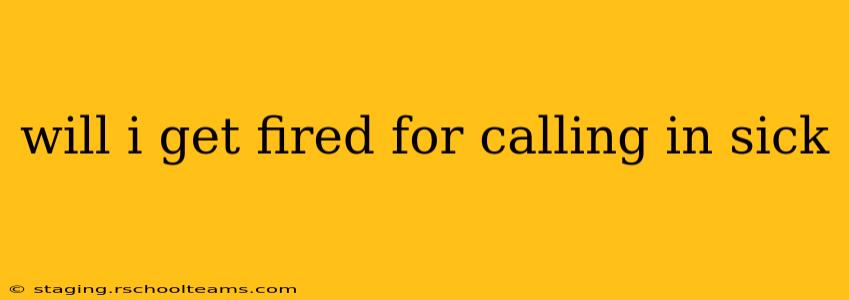Will I Get Fired for Calling in Sick? A Guide to Navigating Sick Days
The question of whether you'll get fired for calling in sick is complex and depends heavily on several factors. While most employers understand the need for sick days, excessive absences or a pattern of questionable calls can certainly put your job at risk. Let's break down the key considerations.
What is my company's sick leave policy?
This is the most crucial piece of information. Your employee handbook, company intranet, or HR department should outline your company's sick leave policy. This policy details the number of sick days you're entitled to, the process for requesting them, and any potential consequences for exceeding the allotted days or abusing the system. Carefully review your company's policy; it's your primary guide. Understanding your rights and responsibilities within the framework of your company's policy is essential.
How often do I call in sick?
Occasional sick days are generally acceptable. However, frequent absences, especially if they cluster together or lack sufficient documentation, can raise red flags. Employers need reliable employees, and consistent absences disrupt workflow and productivity. If your absences are frequent, consider if there are underlying health issues that need addressing. Openly communicating with your employer about ongoing health concerns might be beneficial, but always respect their policies.
Do I have a legitimate reason for calling in sick?
Honesty is crucial. While you don't need to divulge every detail of your illness, calling in sick for a non-medical reason—such as attending a personal appointment or a social event—is unethical and could lead to disciplinary action, including termination. It's generally best to provide a general statement, such as "I'm feeling unwell and unable to come to work today."
How do I call in sick?
Following the proper procedure is vital. Contact your supervisor or designated person through the method specified in your company's policy. This might involve an email, a phone call, or using a specific online portal. Make sure to notify them as early as possible to allow for adequate coverage and minimize disruption.
What if I need more sick days than my company allows?
If you anticipate needing more sick time than your company provides, discuss this with your HR department or supervisor as soon as possible. They may have options such as short-term disability leave or other solutions available. Proactive communication can often prevent negative consequences.
What are the consequences of violating sick leave policies?
Consequences can range from a verbal warning to suspension, and ultimately, termination. The severity of the punishment will depend on your company's policy, the frequency and nature of your absences, and your employment history.
Can I be fired for calling in sick if I have a serious illness?
In most cases, no. However, it’s crucial to communicate your health situation with your HR department and follow the appropriate procedures for leave. You may be eligible for FMLA (Family and Medical Leave Act) protection in the US if your illness qualifies. Consult with your doctor and HR to understand your rights and options.
In Conclusion:
The likelihood of being fired for calling in sick depends on many factors, predominantly your company's policies, the frequency of your absences, the legitimacy of your reason, and your communication with your employer. Transparency, adherence to company policies, and proactive communication are crucial in maintaining a positive employment relationship. Always consult your company's handbook and HR department for specific guidance. This information is for general guidance only and does not constitute legal advice.
